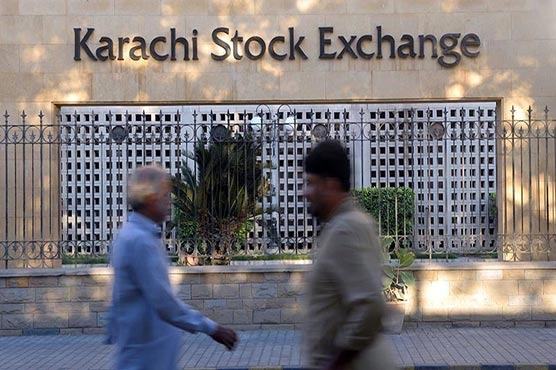Bloodbath at PSX: Index tumbles two-month low as uncertainty surrounds investors

The Index opened at 40,150.34, whereas it closed at 40,143.63 on Friday.
KARACHI (Dunya News) – The benchmark KSE-100 Share Index fell more than 900 points in the trading hours on Monday with the intraday low of 39,233.02, marking a two-month low. The Index opened at 40,150.34, whereas it closed at 40,143.63 on Friday.
At 03.09pm, the Index stood at 39,234.45, down 909.18 or 2.26pc as confusion and uncertainty surrounds potential investors due to several persisting factors.
The stock market in the previous week followed similar trend and lost massive 1,487 points or 3.6pc, representing the highest weekly decline in recent months during which the market regained much stability, and dropped to 40,143.63 at close on Friday.
A staggering sum of Rs276 billion was wiped off the market capitalisation at the Pakistan Stock Exchange (PSX) in five-day trading sessions of the last week. Foreign investors were net sellers in the equity market, offloading $4.1 million worth of shares.
Investors adopted extremely cautious behaviour after more headlines cover mounting deaths due to coronavirus taking full hold, a plunge in global crude oil prices, unchanged main policy rate by the State Bank of Pakistan at 13.25 percent for the next two months, uncertain FATF’s decision and political uncertainty in the country.
The SBP in the latest monetary policy statement kept the interest rate unaltered and pushed selling in the leveraged sectors such as cement and steel. Concerns over higher than expected reading of inflationary pressures and political uncertainty sparked by coalition partners of the government also kept investors away from the market.
Moreover, the outcome of Financial Action Task Force in the upcoming review remained unclear. Several reports claimed that the substantial progress was made to pull the country out of the grey list, but Minister for Economic Affairs Hammad Azhar noted it was premature to speculate on any outcome.
They were also spooked by uncertainty over the decision by the Financial Action Task Force (FATF) on Pakistan status to be decided later this month and the country’s ability to pull itself out of the grey list. Investors were also rattled over the inflation figures for January which came out at an alarming 12-year high of 14.6pc.
Importantly, the investors have also strongly noticed shortfall in revenue collection by about Rs350 billion as review talks with the International Monetary Fund (IMF) have begun for the release of its third tranche under the $6 billion facility.
On political front, unsettled political wrangling among the coalition partners of the government also hit confidence of the investors.
Every year the Chinese New Year celebrations bring supply chains to a halt as factories in China shut down and workers head home for the holidays. This year, however, the outbreak of the 2019 Novel Coronavirus during these holidays has disrupted movements, with the Chinese authorities extending the shutdown to Feb 12 in most provinces.
Some traders and businessmen in Pakistan said that loading of goods in China has come to a halt.
Most industries that depend on raw materials imported from China usually build stocks to last them through the holiday closure, but in some cases at least those stocks are now running low and businesses are left wondering when normal imports might resume.
Asian stocks fall as virus death toll mounts
Southeast Asian stock markets fell on Monday as the death toll from the coronavirus outbreak surpassed the global SARS epidemic of 2003 and weighed on risk appetite in the region.
The virus has claimed the lives of more than 900 people in Mainland China as of Sunday and raised concerns over growth
outlook in the world’s second largest economy.
"The sober fact is that some economic damage is already done (by the coronavirus) and it would be highly complacent to assert that a return to normalcy in sentiment and travel is around the corner," said Taimur Baig and Chang Wei Liang, analysts at DBS Economics & Strategy Research, in a note.
Singapore stocks declined as much as 1.4% in early trade, but had pared some losses by 0338 GMT.
On Friday, the city-state raised its virus alert level to orange, the level reached during the 2003 Severe Acute Respiratory Syndrome (SARS) epidemic, which indicates the virus is severe and passes easily between people.
Financials weighed on Singapore’s main index, with United Overseas Bank Ltd and DBS Group Holdings falling as much as 2% and 1.7%, respectively.
Also hurting sentiment was data that showed China’s consumer inflation in January hit a more than 8-year high as government restrictions on movement drove residents to stock up on essentials.
Vietnamese shares fell up to 1.5%, leading declines in the region. The financial sector weighed on the bourse, with
Joint Stock Commercial Bank for Investment and Development of Vietnam falling 3.3%.
Indonesian equities shed 0.8% and financials were the biggest drag. PT Bank Central Asia Tbk lost 1.2%, while PT Bank Mandiri (Persero) Tbk shed 1%.
Malaysian shares fell up to 1%, with heavyweights Tenaga Nasional falling 3.6% and Public Bank Bhd dropping 1.1%.
The county’s prime minister on Monday said that the Malaysian economy is expected to expand by 4.5% this year, a
downgrade from the government’s initial estimate of 4.8%.
Malaysia has reported 17 confirmed coronavirus cases as of Sunday, and expanded its travel ban on China to include Zhejiang and Jiangsu provinces.
The Philippine index fell 0.6%, with property developer SM Prime Holdings shedding as much as 3.2%. Thailand markets were closed for a holiday.

